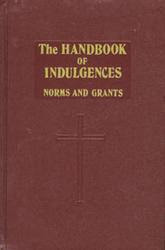Okay, back when I sent the saint to people as an email list, whenever I mentioned Indulgences I used to get emails from someone who was confused about what they are. I figured I would put this classic rant of mine as a permanent page on the website, enjoy!
Indulgences! This is possibly the second most misunderstood concept in the life of a Catholic. (The first being what the Immaculate Conception is). It’s a shame because we let this rich aspect of our church be forgotten in most cases, even to the point many believe we don’t do this anymore, this includes a lot of Priests. Because we don't get it...we can't explain it to non-Catholics so their derision for us continues. So here goes and I will try to be brief.
The Books of Numbers, Leviticus and Proverbs, in the Old Testament and The Apostle John in the New Testament among others, tell us that there are three steps in making ourselves right with God: “If we claim to be without sin, we deceive ourselves and the truth is not in us. If we confess our sins, he is faithful and just and will forgive us our sins and purify us from all unrighteousness.” 1 John 1:8-9
1. Confess our sins (confession)
2. Forgive (sacramental absolution)
3. Purify (indulgence)
The Catholic Church, the legal system and good parents everywhere have always known this.
Sacramental Confession and absolution is the forgiveness of sins we are truly sorry for; the attachment to that sin, the need for purification, remains however. This is the domain of the indulgence. The best explanation I have for an indulgence is from my own experience as a father.
My daughter was “mean” to her younger sister. She was punished by me. Then, later, was genuinely sorry. She was sincere in her apology and asking for forgiveness (confession and forgiveness). Even after she was forgiven, her sister’s feelings were still hurt (attachment to sin).
As a good father do I then say her punishment is not needed? No, a good father will say you were bad so you have to do your punishment. I told her if she did something nice for her sister, instead of the punishment, I would lessen or eliminate the punishment. She did, it made her wounded sister feel better, I remitted the punishment I imposed, (indulgence), and everyone lived happily ever after.
Indulgences have gotten a bad rap historically because back in the day the church said almsgiving was an indulgenced work, as it does today. Giving to the poor is an indulgenced act. In the Middle Ages this became quite specific as to what alms and how much was needed to be given to get the indulgence. The flatulent Martin Luther translated this into “selling” indulgences.
Indulgences are a matter of Catholic Dogma. Unlike the apparitions at Lourdes or Fatima there is no choice here, Indulgences are part of the Church’s infallible teaching. This means that no Catholic is at liberty to disbelieve in them. Not even Father So and So at the church you go to. See the Catechism of the Catholic Church 1472-1479.
An indulgence is like this, it is something the church says is spiritually "nice" to do and it remits some (a partial indulgence) or all (a plenary indulgence) of the temporal punishment connected with the sin that has been forgiven already through confession. Keep in mind though, eternal punishment is in the hands of God alone, the church has no authority to remit any of that. We are saved through the grace of God.
The church publishes a book “The Enchiridion of Indulgences” enumerating all the spiritually “nice” works to do for an indulgence. A free electronic copy of this book can be obtained here.
Since we are sinning all the time, Confession and Indulgences are a great idea whenever they are available in my opinion. I hope this helps.
To get a Plenary indulgence you must always do three things before the act that has an indulgence attached to it; the so called pre conditions:
- first, go to Sacramental confession;
- second, Communion;
- third, a prayer for the Holy Father's intentions.
The three conditions may be fulfilled several days before or
after the performance of the prescribed work. However, it is fitting that
Communion be received and the prayer for the intention of the Pope be recited
on the same day the work is performed. The
astute Catholic might ask “What is ‘several’ days? Old school used to
say, 8 days. In the year 2000 for the
Jubilee, an attempt was made to pin down the Sacred Apostolic Penitentiary
(SAP); they said ‘several’ was 20 days. In
order to further pin them down it was asked again, to clarify; did that appy
only to the Jubilee Year. The SAP said it
applied to the general norms. So, the
highest authority in the Church (apart from the Pope) on indulgences says “20
days” so it is….
You have to be at least generally aware that what you are doing is an indulgenced act. You cannot give an indulgence to a living person but you can do it for the souls in purgatory like family members or friends. There is no card to punch here, no one on Earth will check to see if you do it right, your work is between God and you alone. But bear in mind, He will know if you don't do it or if you do....but do it secretly.
An easy Plenary Indulgence you can get in Lent, after confession, and communion and praying for the intentions of the Pope…make a pious stations of the cross, either formally with others or by yourself…..
An easy partial indulgence is to make the sign of the cross…..

No comments:
Post a Comment